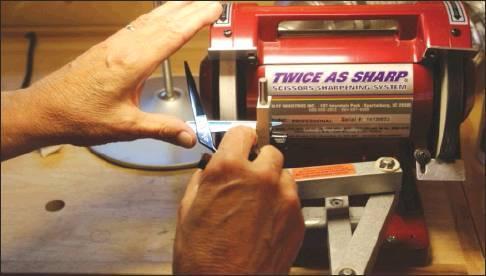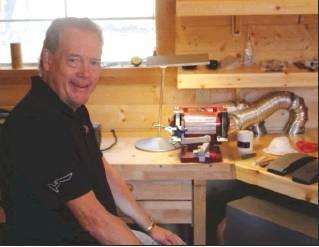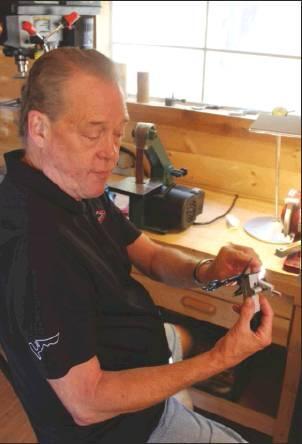Creating the sharpest edge
Rich Hasselberg was discussing the finer points of quilting one day with his wife. Rich’s wife Linda operates Wimberley Stitch Studio across the road from Market Days.
Wouldn’t it be nice, they asked, to be able to sharpen the blade on the rotary tool that’s widely used in quilting? Well, what about scissors, was the next logical question?
It took off from there. How about lawn mowers, pruning shears, chain saws, kitchen knives, basically, anything that cuts, gets dull and needs sharpening?
The Cutting Edge Precision Sharpening was born.
Rich opened shop on July 1. A mechanical engineer, he thought he was going to retire and devote his newly liberated hours to starting a small business. However, sometimes life takes unexpected turns. The firm he works for in Kyle asked if he could stick around until his current aerospace project was completed in December. He said yes. So now he’s working full-time as an engineer and running The Cutting Edge, which caught on from the get-go.
“I haven’t really advertised (The Cutting Edge) yet and I am already swamped,” says Rich.
His compact shop is located at 704 FM2325, across from Gate 3 at Market Days and just behind the Wimberley Stitch Studio. The inside is tidy with a engineer’s sense of organization and efficiency. There are a couple of grinding machines, a drill press and assorted tools. The grinders are hooked up to an exhaust unit that captures the tiny particles created during the grinding process.
Mostly knives, scissors
Rich has teamed up with Wimberley resident Matt Shay, who handles the bigger blades such as lawn mowers and chain saws. Rich pretty much sticks to scissors and knives although he has the capability to sharpen circular blades up to 14 inches in diameter, the kind used on deli slicers. He figures he sharpens 30 or so kitchen knives a week and 10-15 pairs of scissors. Every now and then, dog-grooming scissors or hunting knives are dropped off.
“Everything that needs to be sharpened, we can do it,” says Rich, “from hedge clippers to little scissors.”
Prices ranges from $10 to sharpen sewing scissors to $20 for high-quality salon scissors used by hairdressers. Knives are $1.50 per inch and he’ll give you a quote on larger outdoor equipment. Much of the sharpening is done on the weekends and jobs can be dropped off at the Stitch Studio.
The turn-around time is usually about a week, but sometimes there’s a sense of urgency. The kitchen knives from the Leaning Pear restaurant were delivered, sharpened and back slicing corned beef and fresh mozzarella the next day.
It seems some of the best, most expensive scissors he works on belong to hairdressers. Top-of-the-line salon scissors come from Germany and Japan and can cost $400 or more. “They use them every day and make their living with them,” says Rich, who goes on to explain the “tool steel” salon scissors are flame hardened and then cooled down with oil.
Upholsterers, who have to slice through leather and heavy fabric, are also frequent visitors to The Cutting Edge.
Not all the blades are professional quality. Rich recalls a time a customer brought in an 89-cent pair of scissors for a $10 sharpening. “Those scissors went out of here better than when they were first bought,” he says with a touch of pride.
Cuts: none!
When asked how many times he has been cut or nicked, Rich declares emphatically and without hesitation, “None. We are very safety conscious here.” He wears eye protection and a mask. He also uses heavy leather gloves or gloves that actually contain metal in the fabric. “We tested those gloves and tried to cut into them with a serrated knife — we couldn’t,” Rich says.
According to the website How Products Are Made, grinding wheels have been used in the manufacturing industry for more than 150 years. The grinders at The Cutting Edge are quieter, faster and more sophisticated than those early grinding wheels, but the basic concept is much the same — putting blade to a stone. Rich uses stone or diamond wheels to sharpen things. He sets the angle by putting a mark on the blade. When the blade is pressed against the sharpening wheel and the mark is erased, the angle is spot on. Some jobs are finished on a 5,000-grit sandpaper. Sometimes it takes 10 or 15 minutes to sharpen a blade; sometimes it takes an hour.
Rich, always the mechanical engineer, bought his grinding wheels but designed exacting features that provide a “precision” sharpening.
Rich enjoys the challenges in all types of projects. His pet peeve: dirty blades. His order form clearly states there will be an extra $5 charge for blades caked in grime, glue or tape. “Sometimes people bring in some pretty bad stuff and I have to bring it back to life,” says Rich.
Sometimes a blade will be bent. He can fix that too.
Before a blade graduates from The Cutting Edge it is tested on the material it is intended for. Sewing scissors must slice through fabric. Salon scissors are tried out on human hair. Rich likely draws the line at cutting your lawn to prove the mower blades are sharp.
Are your knives dull? Here’s the Rich Hasselberg test: If you can neatly and cleanly slice through a tomato your blades are fine. If the tomato is squished down and the innards are squirting all over the kitchen, you probably need to visit The Cutting Edge.




